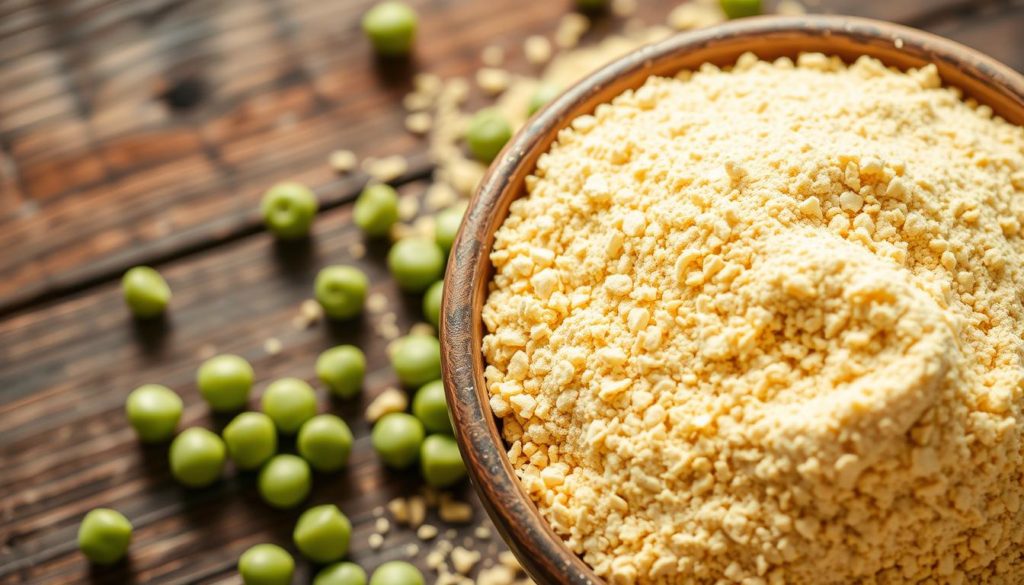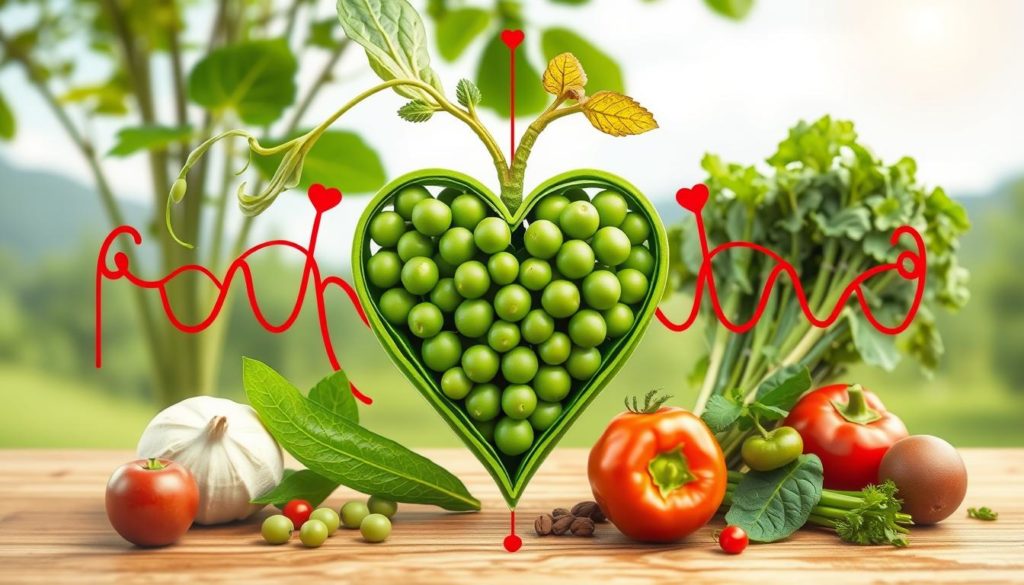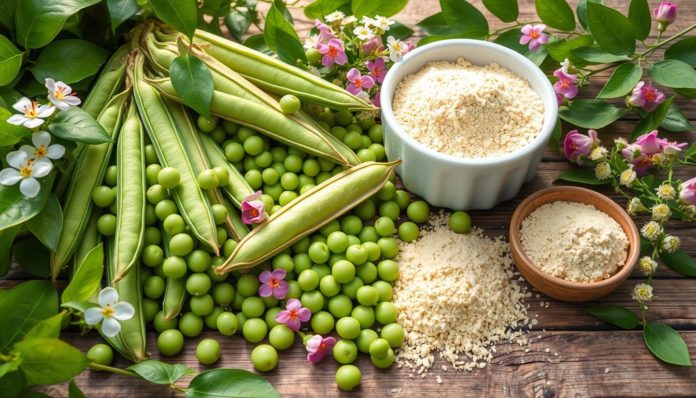Did you know by 2025, the global pea protein market might hit $1.4 billion? This huge number shows its growing popularity.
From yellow split peas comes pea protein. It’s a favorite in health foods for being safe for allergies and vegan friendly. It’s a natural choice for those into fitness, have special diets, or want more plants in their meals.
Pea protein packs a powerful protein hit and has all the amino acids you need. It’s perfect for muscle recovery and adding more protein to your diet easily.
What is Pea Protein?
Pea protein comes from yellow peas. It’s often in the form of pea protein isolate. This protein source is high in nutrition and protein.
Understanding the Basics
Pea protein isolate is popular in the health world. It’s great for those wanting plant-based options. It doesn’t have the allergens found in dairy or soy.
How Pea Protein is Made
The protein extraction process begins with milling peas to flour. Then, the flour is hydrated. This separates the protein from fibers and starches.
The protein liquid is then dried. It becomes a fine, versatile powder. This powder is rich in protein and low in carbs.

The protein extraction process makes pea protein isolate perfect for many products. It’s great for fitness fans or anyone improving their diet. Pea protein is a balanced source of protein.
Health Benefits of Pea Protein
Pea protein is a top choice for health buffs and athletes. It’s great for muscle recovery, heart health, and digestion. This ensures your body gets comprehensive support.
Muscle Growth and Recovery
Pea protein is full of branched-chain amino acids, crucial for building muscle. These help in healing after tough workouts. Adding this protein to your diet improves muscle repair and fitness gains.
Heart Health

Pea protein is good for your heart. It can lower blood pressure and cholesterol. This makes it excellent for a heart-healthy diet and reducing heart disease risks.
Digestive Benefits
Pea protein is easy to digest because it’s hypoallergenic. It doesn’t cause the issues dairy or soy proteins might. Thus, it’s perfect for those with allergies or sensitivities. It helps with nutrient uptake and gut health.
Comparing Pea Protein to Other Vegan Protein Powders
In the world of vegan protein powder comparisons, it’s key to know about each type. Pea protein shines with its full amino acid range. It’s also easily absorbed by the body. Let’s see how pea protein measures up to soy, hemp, and rice protein.
Pea Protein vs. Soy Protein
Soy protein matches pea protein in many ways. Both offer all nine essential amino acids. But soy might cause allergies, unlike pea protein. So, pea protein is often the safer choice for those avoiding soy.
Pea Protein vs. Hemp Protein
Hemp protein is rich in essential fatty acids like omega-3 and omega-6. Yet, it lacks a full amino acid profile, unlike pea protein. Pea protein is also better absorbed. This makes it the top pick for muscle building and recovery using plant proteins.
Pea Protein vs. Rice Protein
Rice protein is also hypoallergenic, making it good for those with allergies. But it needs other proteins to offer complete amino acids. Pea protein doesn’t have this problem, offering all amino acids on its own. So, for a one-stop nutrition source, pea protein beats rice protein in vegan powder options.
How to Choose the Best Pea Protein
When picking the best pea protein, aim for one with lots of protein and no extras. You want a vegan protein powder that’s pure and high quality. Check for certifications and third-party tests to be sure of its quality and safety.
| Criteria | Importance |
|---|---|
| Protein Content | Look for a high protein content to maximize nutritional benefit. |
| Additives | Minimal or no additives ensure product purity. |
| Sweeteners | Natural sweeteners are preferred; avoid artificial ones. |
| Artificial Flavors/Colors | Choose products without artificial ingredients to maintain high-quality. |
| Organic Certification | Opt for organic certifications to guarantee clean ingredient sourcing. |
Knowing what to look for helps in making the right choice. If a brand is open about where it gets ingredients and how it makes the powder, it’s likely good. Watch out for the sweeteners used and any artificial stuff in your product.
“Selecting the best pea protein involves careful consideration of various factors such as purity, additives, and certification to ensure you’re getting a product that aligns with your health goals.”
Go for brands that prove their quality with third-party tests. This shows the protein purity and tells you the product is good. With these tips, you can find a pea protein powder that fits your nutrition needs perfectly.
Incorporating Pea Protein into Your Diet
More and more people are exploring plant-based eating. Pea protein has become a popular choice. It’s very easy to add to different meals. It’s great for adding extra protein to your diet in delicious ways.
1. Smoothies and Shakes: A common way to use pea protein is in smoothies and shakes. It doesn’t change the taste much, so it’s good with fruits and veggies. You get a protein boost in your drink.
2. Baking: Pea protein can also go into your baking. Adding it to cookies, muffins, or bread boosts nutrition. It’s a smart way to make your treats healthier.
3. Savory Dishes: Add pea protein to soups, stews, and casseroles. It mixes in smoothly, giving these dishes more protein. The taste stays great.
4. Breakfast Boost: Add it to oatmeal or yogurt to start the day right. It’s a simple step for those on pea protein diets. It makes breakfast more nutritious.
| Meal Type | Incorporation Method | Benefits |
|---|---|---|
| Smoothies & Shakes | Add one scoop to your favorite smoothie recipe | A quick and easy protein boost |
| Baking | Mix into the batter of cookies, muffins, and bread | Enriches baked goods with protein |
| Savory Dishes | Blend into soups, stews, and casseroles | Extra protein without changing flavor |
| Breakfast | Mix into oatmeal or yogurt | Enhances morning nutrition |
Adding pea protein to your meals is good for everyone. Not just for those into plant-based eating. Try out these tips. See how well pea protein can become a part of your meals.
Organic Pea Protein: Is it Worth the Hype?
More people are thinking about their health and the planet now. That’s why organic pea protein is getting so popular. It’s made through careful organic farming, so it’s very pure and brings a lot of benefits.
Benefits of Organic Pea Protein
Organic pea protein comes from peas grown without harmful chemicals. This not only gives a healthier product but also helps make protein powder in a way that’s better for the earth:
- Environmental Impact: Organic farming is good for the planet. It helps keep the soil healthy and supports different kinds of life.
- Healthier Choice: Since it’s free from bad chemicals, organic pea protein is a safer choice. It’s good for those who don’t want additives or toxins.
- Nutrient-Rich: It usually has more important nutrients, making it better for your diet.
Where to Buy Organic Pea Protein
You can find good organic pea protein more easily these days. Here are some ways to buy it:
| Source | Description |
|---|---|
| Online Retailers | Sites like Amazon and Vitacost have many brands and products. |
| Health Food Stores | Places like Whole Foods and Sprouts usually have high-quality organic pea protein. |
| Specialty Retailers | Smaller shops often have unique brands and types you won’t find elsewhere. |
Understanding Non-GMO Pea Protein
Non-GMO pea protein is becoming more popular. People who care about health are driving this trend. It’s because they worry about genetically modified organisms in food. Choosing non-GMO pea protein means picking a product that hasn’t been changed at a genetic level. This option is seen as more natural and healthier.
Why Non-GMO Matters
Genetically modified organisms are stirring up a lot of debates. People question their effects on health and our planet. By choosing non-GMO pea protein, you support farming that shuns genetic tweaks. This choice favors biodiversity and cuts down on chemicals. It’s a step towards a diet and lifestyle that embrace the natural form of food.
Label Reading Tips
To choose non-GMO pea protein with confidence, you must get good at reading labels. Here are some tips to help you:
- Look for Certifications: Make sure the product is certified by reputable groups like the Non-GMO Project. This is your proof that the peas are not genetically modified.
- Check Ingredient Lists: Choose products with clear and simple labels. Simple ingredient lists often mean the company values quality and honesty.
- Understand Terminology: Get to know terms like “genetically modified,” “bioengineered,” and “non-GMO.” Understanding these will help you pick products wisely.
Choosing non-GMO pea protein helps you avoid genetically altered food. You’ll also support farming that’s open and sustainable. With the right knowledge, your choices can benefit your health and the world around you.
Top Pea Protein Powders on the Market
Looking for top pea protein powder? The market offers many high-quality choices. Brands like Vega, Orgain, and NOW Sports are top picks, known for their flavor and good ingredients. These brands get great reviews from customers looking for vegan protein options.
A top pick is organic pea protein powder for its clean ingredients. It’s great in recipes and offers several subscription plans. This makes it handy for those who use it often.
Vega stands out because their protein tastes good and is nutritionally balanced. They mix pea protein with other plants for the best amino acids. Orgain is also loved for its smooth feel and good taste, winning over many who want vegan protein.
NOW Sports is known for its simple and natural pea protein powders. They’re perfect for anyone avoiding artificial stuff. These brands are highly regarded for their commitment to quality and making customers happy.
In short, look for clear ingredients, good reviews, and flexible products in pea protein powders. Brands like Vega, Orgain, and NOW Sports offer great taste and health benefits. They meet the needs of health-conscious users without compromise.
Pea Protein Recipes You’ll Love
Searching for new ways to enjoy protein-packed meals and snacks? These pea protein recipes are amazing for any meal. They’re ideal for anyone looking to add more plant-based protein to their diet. Enjoy them from breakfast to snacks on the move.
Pea Protein Smoothies
Smoothies are a simple and tasty method to use pea protein. Just blend your favorite fruits, some greens, and pea protein powder. You get a delicious drink that fills you with energy for the day.
Pea Protein Pancakes
Start your day with pea protein pancakes for a protein-rich meal. Just combine the protein powder with oat flour, almond milk, and vanilla. Add fresh berries and maple syrup on top for a tasty morning.
Pea Protein Energy Balls
For a speedy, healthy snack, make pea protein energy balls. Mix dates, nuts, and pea protein powder, then shape them into small balls. They’re great for an on-the-go snack filled with plant-based energy.
| Recipe | Main Ingredients | Benefits |
|---|---|---|
| Pea Protein Smoothies | Fruits, Greens, Pea Protein Powder | Quick Energy Boost |
| Pea Protein Pancakes | Oat Flour, Almond Milk, Vanilla Extract | Protein-Rich Breakfast |
| Pea Protein Energy Balls | Dates, Nuts, Pea Protein Powder | Convenient, Healthy Snack |
Frequently Asked Questions About Pea Protein
Pea protein FAQs often discuss its health benefits. They compare it to other protein sources. Plus, its role in different diets is examined. A common question is if pea protein has all nine essential amino acids. Yes, it does. This makes pea protein a complete source for your body’s needs. It’s a top pick for those wanting high-quality, plant-based protein.
Another big question is about how well our bodies can digest pea protein. People ask if it’s as easy to digest as dairy-based proteins like whey. Pea protein is known for being easy on the stomach. It also has a low chance of causing allergic reactions. It doesn’t have common allergens like gluten or dairy, making it great for people with allergies or digestive issues.
Many are curious about pea protein’s effects on muscle growth and managing weight. Studies show that pea protein can help build muscle, especially after exercising. For those looking to lose weight, it helps you feel full, which can lead to eating less. For more details, check out this comprehensive guide on pea protein. Adding it to your diet is easy, like mixing it into smoothies or recipes.
FAQ
What is pea protein?
Pea protein comes from yellow split peas. It’s a favorite vegan protein because it’s safe for those with allergies. It has all the amino acids your body needs. It’s a great swap for meat-based proteins.
How is pea protein made?
To make pea protein, peas are turned into flour first. Then, they mix the flour with water and separate the protein. After that, they dry the protein liquid and grind it into powder. This powder is called pea protein isolate.
What are the health benefits of pea protein?
Pea protein helps muscles grow and heal. It’s good for the heart because it may lower blood pressure and cholesterol. Also, it’s easy on the stomach for most people.
How does pea protein compare to other vegan protein powders?
Pea protein has all nine essential amino acids, making it very nutritious. It’s easier to digest than other vegan proteins. It also doesn’t cause allergies like soy or need to be mixed with other proteins like rice protein.
How do I choose the best pea protein?
When picking pea protein powder, look for one with a lot of protein and few additives. Check if it’s been tested for purity. Also, see if it’s organic and watch out for artificial stuff and sweeteners.
How can I incorporate pea protein into my diet?
You can add pea protein to smoothies, shakes, and oatmeal. It’s also great in baked goods like pancakes. Its mild flavor works well in both sweet and savory dishes.
What are the benefits of organic pea protein?
Organic pea protein is made from peas not treated with chemicals. This means it’s a cleaner choice and it helps the environment. It’s perfect for those caring about the earth and their health.
Why should I choose non-GMO pea protein?
Non-GMO pea protein is from peas that aren’t genetically modified. Look for the non-GMO label to make sure. Knowing what the labels mean will help you make the best pick.
What are some top brands of pea protein powders?
Some top brands are Vega, Orgain, and NOW Sports. They are known for their quality pea protein that tastes great. They provide options without flavor and various flavors, fitting different dietary requirements.
Can you share some easy pea protein recipes?
Sure! Try making pea protein smoothies, pancakes rich in protein, or energy balls that don’t need baking. These recipes are fun and tasty ways to get more pea protein in your diet.


